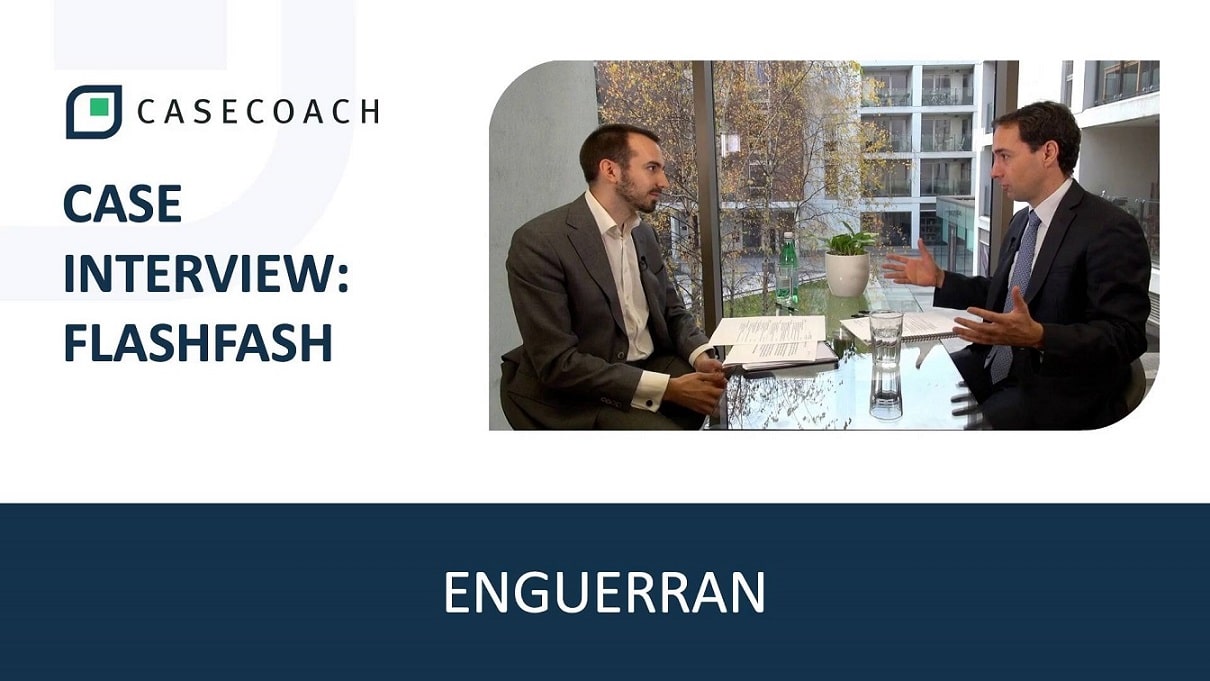The case interview is a challenging interview format that simulates the job of a management consultant, testing candidates across a wide range of problem-solving dimensions.
McKinsey, BCG and Bain – along with other top consulting firms – use the case interview because it’s a statistically proven predictor of how well a candidate will perform in the role. The format is not only used by management consulting firms. Other types of organizations – like tech companies, financial services institutions, and non-profits – often use case interviews to assess candidates who are interviewing for roles focused on shaping strategic initiatives.
If you’re preparing to face a case interview, you may be feeling a little apprehensive. The format is notoriously demanding and unlike any other type of recruitment assessment you may have experienced before. However, with the right preparation and investment of time and effort, it is possible to master.
In this guide, we break down everything you need to know about the case interview, outlining exactly what you need to do to prepare effectively and ace the case.
Key takeaways
- The classic case interview format follows the same steps that a management consultant would encounter on a client project. The interview is a little like a role-play where the interviewer plays the role of a client and the candidate plays the part of the consultant hired to solve the problem.
- Some firms occasionally deviate from the classic case interview format. Popular alternatives include written case studies – which require candidates to review paper documents and then prepare and deliver a presentation – and market sizing case interviews, which require candidates to estimate a number.
- Case interviews test candidates against a set of six problem-solving dimensions: structuring, math, judgment and insights, creativity, synthesis, and case leadership. The interviewer uses a scorecard to assess the candidate’s performance in each of these areas.
- Case interview questions can be about almost any type of challenge or opportunity. However, our research indicates that there are 10 types of questions that are asked most frequently at top consulting firms. These include questions on profit improvement, revenue growth, and market entry.
- To do well in a case interview, it’s vital to create custom interview structures that meet the conditions of the ‘AIM’ test. It helps to have a good working knowledge of key case interview frameworks, but this alone is not sufficient.
- A strong grasp of case math is also crucial when it comes to case interview performance. While only high-school level math skills are required, it’s an aspect of the case interview that many candidates find challenging.
- Successful candidates are able to summarize their findings effectively. They also demonstrate strong case leadership by progressing through the case proactively and remaining focused on its overarching objectives.
- To prepare for a case interview, it’s essential to learn every problem-solving skill that will be assessed. We teach all of these skills in the Case Interview Prep Course, provided as a part of our Consulting Interview Prep Toolkit which contains all the online courses, sample interviews, case material, and practice tools you’ll need to ace any case interview.
- Most candidates who go on to receive an offer from a top consulting firm like McKinsey, BCG or Bain complete at least 25 live practice sessions with a partner before their interview. You’ll find over 100 high-quality cases in our Case Library and a diverse community of candidates available for practice in our Practice Room.
- Some candidates choose to supplement their preparation by working with a coach who has been an interviewer at a top consulting firm. Here at CaseCoach, our coaches have all been handpicked from the alumni of top firms such as McKinsey, BCG and Bain.
- Although the world’s top consulting firms all test candidates using similar methods, none of them approach the interview process in exactly the same way. If you’re preparing to interview at a top consulting firm, it’s important to do your research and find out what you can expect.
An introduction to the case interview
The case interview format
The classic case interview
The vast majority of case interviews follow the same steps that management consultants encounter on real client projects.
- Brief: The interviewer gives the candidate a brief for the case. They explain the context in which the client is operating, and outline the challenge they’re facing.
- Clarification: The candidate then has the chance to ask clarifying questions. They might do this to ensure they’ve understood the context of the problem correctly or to confirm the client’s goals.
- Reflection: The candidate takes 60 to 90 seconds or so to reflect and lay out a structured approach to solving the case.
- Analysis: The candidate and interviewer then work through the case together, carrying out analyses and moving toward a recommendation. This is the part of the case where you’ll be handling numerical questions, reviewing exhibits, coming up with creative ideas, and so on. It comprises the vast majority of the time you’ll spend on the case.
- Synthesis: The case concludes with the candidate synthesizing their findings and making an overall recommendation to the client.
So what does this unique interview format look and feel like? In reality, a consulting case interview is a little like a role-play. The interviewer plays the role of a manager or client, and the candidate plays the part of the consultant hired to solve the problem. However, a case interview shouldn’t feel like a performance. The most successful candidates treat it as a natural conversation between two professional people.
In the video below you can see an example of exceptional case interview performance in action. The candidate and interviewer in the video are both former McKinsey interviewers.

Interviewer-led vs candidate-led cases
Although the classic case interview has an established format and assesses a specific set of skills, cases can be delivered in different ways. Some are more candidate-led, while others are more interviewer-led
In a candidate-led case, the candidate is in the driver’s seat and is free to explore different aspects of the problem. Interviewers don’t tell candidates what to focus on next. Instead, they provide additional information – like an exhibit or a new fact – when asked. The candidate then analyzes the information and suggests next steps to get to the answer.
In an interviewer-led case, the interviewer may interrupt the candidate and ask them to either perform a specific investigation or focus on a different aspect of the problem. This doesn’t mean the interview is going badly; the interviewer is simply following a script. As a result, in an interviewer-led case, candidates are less likely to take the wrong path.
It’s difficult to predict which style of case you’ll receive. Some firms are known for using one style of interview more frequently than another. However, in practice, most interviews fall somewhere between the two extremes, depending on the style of the interviewer and the case material they’re using. You should therefore always be ready to suggest next steps and have a view about how to get to the answer.
Other case interview formats
While the classic case interview is most common, there are a couple of other interview formats that top consulting firms use from time to time:
The written case study
Some management consulting firms use written case studies to simulate the experience of carrying out consulting work even more accurately than the classic, verbal case interview. In some locations, BCG and Bain have been known to adopt this approach for a small minority of candidates.
In written cases, candidates review a series of paper documents and then structure the problem, run some numbers, generate ideas and, finally, deliver a short presentation. You can learn more in our article on how to crack written case studies.
Market sizing case interviews
Management consulting firms and other employers sometimes use market sizing questions – also known as estimation questions – as a standalone interview format to assess candidates on a wide range of problem-solving dimensions.
In a market sizing interview, you’ll be asked to estimate a number. This might be something like the revenue of a sandwich store or how many ATMs there are in a certain city. The ability to size a market is also a skill required for solving many case interview questions. You can learn more in our article on how to nail market sizing case interviews.
Some key differences to expect
While case interviews are highly codified, it’s important to remember that every interview is unique.
In the final round of interviews, for example, cases may feel less scripted than they did in the first stage. Partners – who are part of the interviewing group in the final round – often use the same case for years at a time. This means they can deliver it without a script and, as a result, tend to give candidates more room to take the lead. You can learn more in our article on the differences between a first and final-round interview at McKinsey, BCG and Bain.
In addition, each firm or office might bring their own nuance or style to the classic case interview format. It’s important to do your research and find out what you can expect from the interview experience at your target firm or office. You can learn more in our article on how the interviews at McKinsey, BCG and Bain differ.
The skills assessed in case interviews
Case interviews are primarily about testing a set of problem-solving skills. The interviewer uses a scorecard to assess a candidate’s performance in the following dimensions:
- Structuring: This is the ability to break problems down into logical drivers. It’s most obviously required at the beginning of a case, where you can pause and take a moment to come up with an approach. But it’s also tested each time you have to consider a new aspect of the problem.
- Math: Most cases contain a quantitative component, such as estimation questions, break-even questions, or other calculations. To do well in this dimension, you need to lay out a clear and efficient approach, run calculations quickly and accurately, and then state their implications for the case.
- Judgment and insights: This dimension is about extracting insights from data, usually by interpreting information in a chart. Performing well in this area involves processing new information quickly, prioritizing what’s important, and connecting your findings to develop sound recommendations.
- Creativity: Cases often have a creative thinking component. Sharing numerous, varied and sound ideas – ideally in a structured way – can help you succeed here.
- Synthesis: This is all about wrapping up the case with a clear and practical recommendation, and delivering it convincingly.
- Case leadership: This dimension is about progressing through the case efficiently and staying focused on its objectives. Case leadership involves gathering facts effectively and building on new findings to develop a recommendation. It’s a particularly important dimension in candidate-led cases.
Questions to expect
If you’re preparing to interview at a top management consulting firm like McKinsey, BCG or Bain, you’re probably curious about the kind of case interview questions you can expect to receive.
To identify the most common case interview questions, we surveyed CaseCoach users who interviewed at either McKinsey, BCG or Bain for a generalist role in 2023. We found that of the 260+ case interviews reported by respondents:
- 20% focused on profit improvement
- 15% focused on revenue growth
- 12% focused on market entry
- 10% focused on cost cutting
- 9% focused on process optimization
These topics align with the typical challenges and opportunities faced by CEOs. Because the job of a management consultant is to help CEOs find solutions to these problems, it’s vital for candidates to demonstrate that they understand the issues behind these questions.
However, while there are some recurring topics, the context and nuances of each individual case mean that no two case questions are the same. Increasingly, firms are testing candidates on questions that fall outside of these recurring topics. One way they’re doing this is by focusing on non-traditional areas, like the public sector. If you’re interviewing for a generalist management consulting role, it’s therefore important to be ready for almost any type of case question.
If you’re interviewing for a role that’s focused on a specific industry or function, like financial services, you’ll likely be given a case focused on that particular area.
How to ace the case
Case interviews require you to think on your feet to solve a complex problem that you’ve never seen before, while being assessed against a number of problem-solving dimensions. Here’s what you need to do to rise to the challenge and ace the case:
1. Create case interview structures that meet the AIM test
Of all the case interview assessment dimensions, structuring is perhaps the most challenging, particularly for those who are just starting out. It requires candidates to propose a prioritized and insightful approach to the case that’s composed of a comprehensive set of independent drivers. Structuring plays a foundational role in the interview, setting the course for the entire conversation.
So, what does good case structuring look like? An effective structure should meet the conditions of the ‘AIM’ test. ‘AIM’ stands for:
- Answer-focused: The structure should identify the client’s goal and the question to solve. It should also provide an approach to answering that question.
- Insightful: The structure should be tailored to the specifics of the client or to the problem in question. You shouldn’t be able to apply it to another case of the same type.
- MECE: This is a well-known acronym among consultants. It stands for ‘mutually exclusive and collectively exhaustive’. In plain English, if a structure is ‘MECE’ it has been broken down into an exhaustive set of independent drivers.
2. Know key case interview frameworks
In a case interview, you’ll be asked to structure a variety of problems. There are a number of frameworks that can help you do this, whether the problem you’re structuring corresponds to a common case question or a different topic entirely:
Business frameworks
You can use established business frameworks to craft custom structures for the most common types of case questions. These include frameworks for mastering profitability questions, answering revenue growth questions and nailing market sizing questions.
Academic frameworks
For unusual case questions that don’t relate to an obvious business framework, it can be helpful to draw on an academic framework like supply and demand, ‘the three Cs’, or Porter’s Five Forces. You can learn more about all of these in our ultimate guide to case interview frameworks. The article includes other business and academic frameworks that you can use to craft custom structures for case questions.
Logical frameworks
Finally, logical frameworks can help you look at the big picture in order to structure your approach. These options can be particularly useful when you’re faced with an unusual case question that doesn’t lend itself to a business or academic framework. Some examples of logical frameworks include:
- Structuring with equations: This approach is most helpful for quantitative case questions. Listen out for introductions that focus on a number. These cases can often be broken down into an equation and then structured along its variables.
- Structuring based on hypotheses: This approach is most helpful for structuring qualitative cases. It involves laying out what you most need to believe in order to validate a specific recommendation. These beliefs form your set of key hypotheses, which you then test as you progress through the case.
- Structuring with root causes: This approach works well for structuring cases that require identifying the reasons for a problem. It involves laying out its potential causes in a way that is mutually exclusive and collectively exhaustive (i.e. MECE).
How to apply these frameworks
While business, academic, and logical frameworks can be helpful when it comes to structuring a problem, learning how to use them correctly is a skill in itself. Simply applying a framework to a case interview question in a ‘cookie-cutter’ fashion is not enough. To impress your interviewer and pass the AIM test, your structure will need to be heavily tailored to the situation at hand. In fact, many case questions can be best answered by combining different frameworks.
Ultimately, interviewers want to understand how your mind works and see you think on your feet. You’ll therefore need to demonstrate that you can propose a custom case interview structure to any question.
3. Be comfortable with simple math
Management consulting firms expect you to navigate mathematical problems confidently and reliably in case interviews. Regardless of your academic background or past experience, you’ll need to be able to set an approach to solve the problem, perform calculations quickly and accurately, and state the implications of your solution.
The good news is that you’ll only be required to demonstrate a high-school level of math skills in case interviews. However, with no calculators allowed and an interviewer looking over your shoulder, it’s natural to find this aspect of the experience a little intimidating.
So, what can you expect from case math? The problems you’ll be asked to solve may take the form of straight calculations, exhibits that require calculations, word problems, and estimation questions.
To do well in this part of the case interview, you’ll need to have a strong understanding of:
- The four operations: addition, subtraction, multiplication, and division
- Key math concepts such as fractions, percentages, and weighted averages
- Business math concepts such as income statements, investments, and valuations
To stand out to your interviewer, you’ll also need to work through math problems confidently and efficiently. Here are our top tips for doing this:
- Keep track of zeros: Case questions often involve large numbers, sometimes in the millions or even billions. Keeping close track of your zeros is therefore crucial. We recommend either counting the zeros in your calculation, using scientific notation, or assigning letter units to zeros.
- Simplify your calculations: This will help you work through problems quickly and efficiently while reducing the potential for mistakes. One way of simplifying calculations is by rounding numbers up or down to make them more ‘friendly’.
- Memorize frequently-used fractions: Some fraction values are used so frequently in case math that knowing them – along with their percentage value and decimal conversions – can save you significant time. We recommend memorizing the fraction and corresponding percentage and decimal values of 1/2, 1/3, all the way through to 1/10.
You can learn more in our guide to mastering case interview math.
4. Summarize your findings
Synthesis is a key skill assessed by interviewers, predominantly at the end of a case interview. You need to provide a clear and sound recommendation that answers the overall question convincingly. You must also describe the key supporting points that informed your recommendation and then outline any further steps you would advise the client to take.
When it comes to concluding cases effectively, this four-step framework can be extremely helpful:
- Quickly play the case question back to your interviewer.
- Answer the question directly and briefly by distilling your response into a single sentence, if possible.
- List the points that support your conclusion.
- Outline the next steps that you recommend to the client.
You can learn more in our article on how to conclude a case study interview.
5. Bring it all together with strong case leadership
Case leadership, more than any other dimension, will give your interviewer an indication of how independently you could handle your workstream as a consultant. It’s a particularly important skill in candidate-led cases, where you’ll set the course of the discussion without the interviewer steering you in a particular direction.
Demonstrating strong case leadership means progressing the case efficiently and staying focused on its overarching objectives. Using a ‘tracker page’ to capture your structure and organize your notes throughout the case will help you in this regard.
Another aspect of case leadership is gathering facts effectively. This includes making reasonable assumptions, requesting missing information, and asking probing questions.
Finally, you’ll be expected to build on new findings to develop your recommendation, adapt your approach, and suggest next steps.
Effective case leadership is all about showing your interviewer that you have a strong command of the problem-solving process. After investigating each key driver in your structure, you need to be able to articulate where you are in your overall approach to solving the problem, and what the next steps should be.
To do this, we recommend using a five-step process to handle every kind of analysis you conduct during the case, whether you’re responding to a numerical question, the data in an exhibit, or something else.
Here’s what that five-step process looks like:
- Set your approach. Define what you’re going to do upfront. It’s particularly important to be explicit here, especially if the analysis is in any way complex or ambiguous.
- Conduct your analysis. Your approach here will vary according to the kind of question you’re working through.
- State your findings. You may also want to make a note of your findings on your tracker page.
- State the implications of your findings. Explain how they impact both your answer to the question and the client’s broader goal.
- Suggest next steps. Your findings will sometimes change how you want to approach the rest of the case. This may mean altering your initial structure and editing it on your tracker page.
6. Be your best on the day
When the day of your interview comes around, you’ll want to be at your very best. But what exactly does this mean?
First, you should present yourself in a professional manner. It goes without saying that you should arrive on time but, ideally, you should plan to arrive early. You should also come equipped with the right material: a pen, squared A4 or letter-size paper pad, and copies of your resume. It’s also vital to dress appropriately for the occasion. Usually, this means wearing formal business dress, but this means different attires in different locations. We recommend doing some research to find out what consultants wear at your target firm and office.
To be at your best on the day of your interview, you must be well rested. Sadly, tiredness is one of the most common reasons for underperformance in consulting interviews. The day before is not the time to cram in further preparation. Instead, aim to have a quiet day and to get plenty of sleep at night.
Ultimately, consulting firms want to hire people who can represent the firm and interact with clients at every level, from the shop floor to the C-suite. Successful candidates treat the case interview as an opportunity to play the role of a management consultant advising a client (i.e. the interviewer). This means exhibiting a great deal of confidence and credibility, together with effective communication and an engaging attitude. It’s vital to stay focused on the overall problem and to drive the resolution of the case while being receptive to the interviewer’s input.
There are a lot of balls to juggle in a case interview, with the added pressure of a potentially life-changing outcome, but successful candidates don’t let their nerves get the better of them. We’ve provided some helpful hints and tips in our article on handling the stress of consulting interviews.
Being your best on the day of your interview requires extensive preparation. It means mastering each dimension of the case interview scorecard to the extent that the skills become second nature to you. It also means completing sufficient case practice to be able to focus on the big picture of the case you’re solving, rather than on simply demonstrating a set of skills.
To see all this in action, take a look at these two examples of strong case interview performance.
How to prepare for case interview success
Delivering a standard of performance worthy of an offer from a top firm requires extensive case interview prep. In our experience, most successful candidates invest around 60 hours – or 10 hours each week over a six-week period – in their preparation. Failing to put this effort in is among the most common reasons why many candidates are unsuccessful.
Here’s what effective case interview preparation involves:
Learning the skills
In a case interview, your performance is assessed against a set of common problem-solving dimensions. To recap, these are structuring, math, judgment and insights, creativity, synthesis, and case leadership. It’s important to:
- gain a precise understanding of the expectations on each of these skills
- learn the techniques that will allow you to meet these expectations
- practice until your performance meets the required standard
We teach all these skills in the Case Interview Prep Course, included in our Consulting Interview Prep Toolkit. In our bite-sized video classes, we map out each of the key skills assessed in a case, and explain what you need to know to demonstrate each skill. We also share our tips on how to improve in each dimension, going above and beyond the advice we’ve included in this article.
In addition, our Case Interview Prep Course includes many more sample interviews that show real candidates – who went on to join top consulting firms – solving cases. Former consulting interviewers explain what the candidates did well on each dimension and where they could have improved.
Math is a critical prerequisite to handling cases and is something you should be comfortable with before you begin practicing. Our Case Math Course – provided as part of the Consulting Interview Prep Toolkit – will help you brush up your skills. It contains 21 video classes that cover everything you need to know, including the four operations, key math concepts, our pro tips, and business math.
After watching the classes in our Case Interview Prep Course and Case Math Course, we recommend heading to the ‘Drills’ area of CaseCoach, where you can start practicing specific skills. Drills are interactive exercises that pose rapid-fire questions and provide instant feedback. They help you build your skills and confidence in specific case dimensions quickly, allowing you to make the most of your live case practice with partners. Our Consulting Interview Prep Toolkit includes a comprehensive set of drills in six key areas: structuring, calculation, case math, market sizing, chart interpretation, and creativity.
Practicing
When it comes to succeeding in a case interview, nothing beats live practice with a partner. Most candidates who go on to receive an offer from a top consulting firm like McKinsey, BCG or Bain complete at least 25 live practice sessions before their interview.
To practice live cases with a partner, you’ll need access to both case material and practice partners. In our Case Library, you’ll find over 100 cases – complete with solutions – developed by former management consultants. You can download eight of these cases right away by creating a free CaseCoach account. You’ll find a diverse community of fellow candidates who are all available for case interview practice in our Practice Room, where we facilitate over 3,000 practice sessions a week.
You can learn more in our article on how to practice case interviews.
Working with a coach
Some candidates choose to supplement their preparations by working with a consulting interview coach who has been an interviewer at a top firm.
These coaches have the skills and experience to gauge your level of performance and help you identify your areas of strength and weakness. They can also provide you with accurate and helpful feedback on your case-solving skills. This insight can help you accelerate your preparation and improve your performance. Getting used to interviewing with a professional should also help to reduce the stress of the consulting interview experience.
Here at CaseCoach, our coaches are all former consultants and interviewers who have been handpicked from the alumni of top firms such as McKinsey, BCG and Bain.
Do your research
Although employers who use case interviews all test candidates using similar methods, none of them approach the interview process in exactly the same way.
For instance, if you expect to interview with McKinsey, Bain or BCG, it’s helpful to know that these firms all give cases of similar complexity. However, there are some key differences. For example:
- Bain has been known to use estimation questions, such as market sizing, in interviews for its most junior (i.e. Associate Consultant level) roles.
- BCG and Bain occasionally use written cases.
- When it comes to the ‘fit’ interview, McKinsey uses its Personal Experience Interview format, while most Bain offices now use a ‘behavioral interview’. Only BCG consistently uses the classic fit interview format.
Other differences include the number of rounds of interviews each firm conducts, and their preference for using interviewer-led or candidate-led cases. Wherever you interview, it’s vital to do your research and find out what you might be able to expect.
When it comes to getting ready for the case interview, knowing what you will be assessed on, learning how to succeed, and having access to the best practice resources can all go a long way. Now, you need to put in the hard work and prepare! Good luck.







